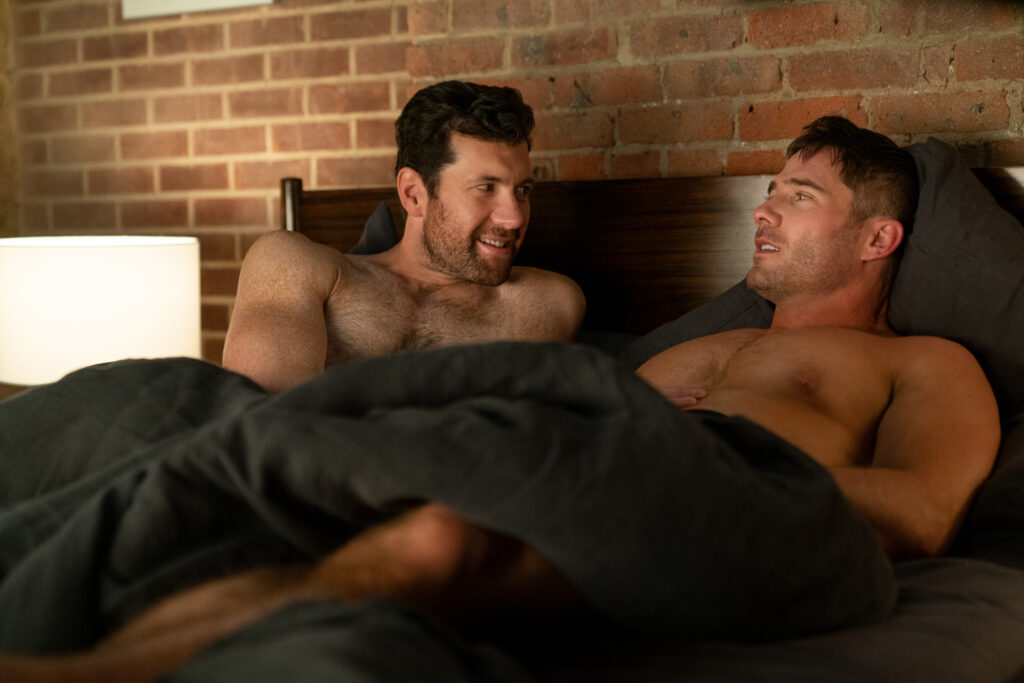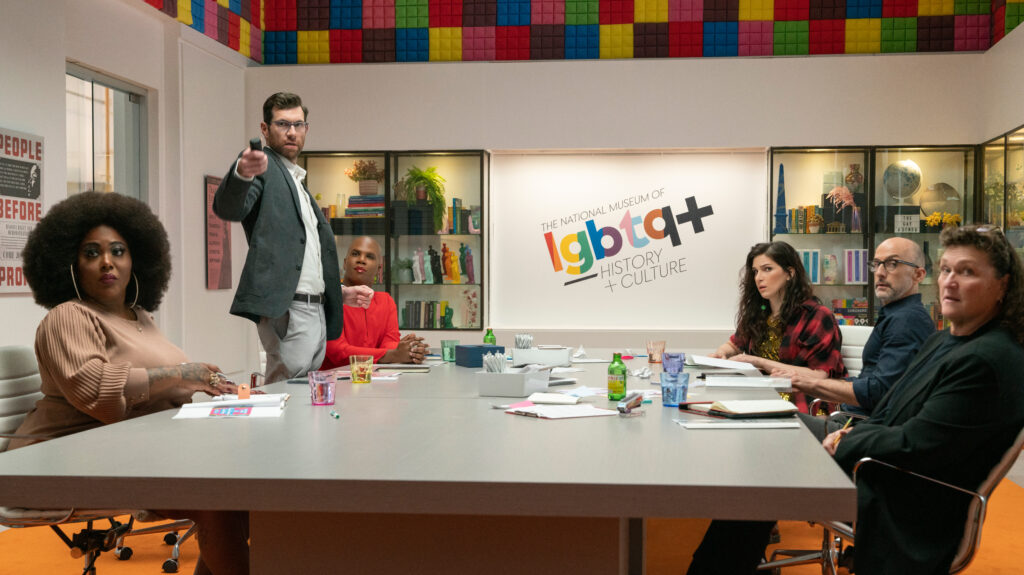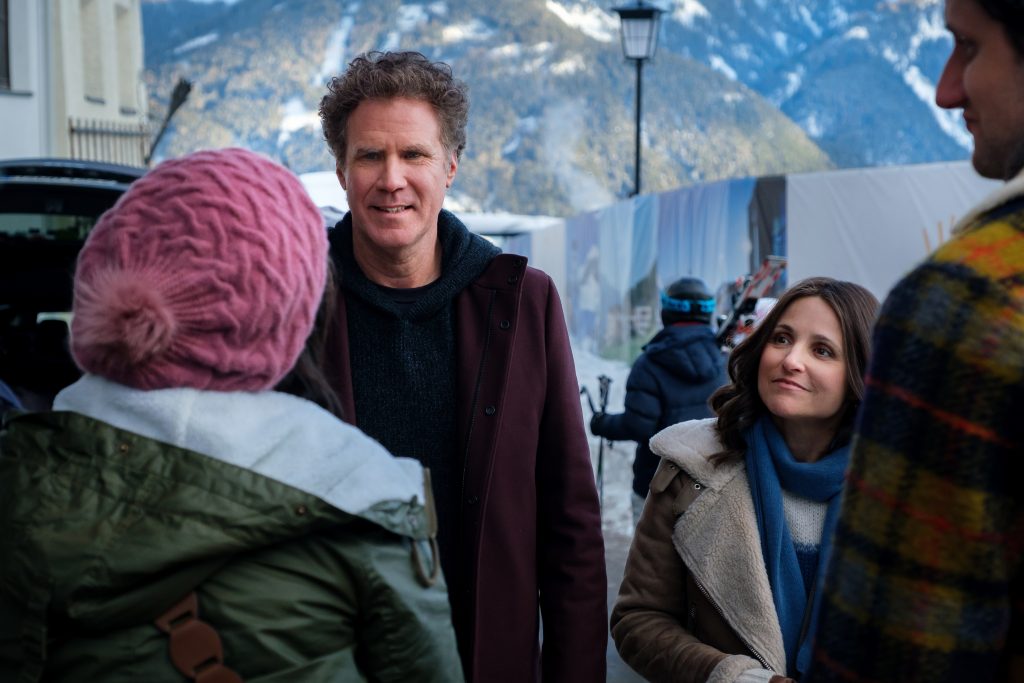September 30, 2022
by Carla Hay

Directed by Nicholas Stoller
Culture Representation: Taking place in New York and briefly in Provincetown, Massachusetts, the comedy film “Bros” features a cast of predominantly white characters (with some African Americans, Asians and Latinos) representing the working-class, middle-class and wealthy.
Culture Clash: An openly gay podcaster/writer, who is very cynical about finding love, begins a new job as executive director of a museum for LGBTQ+ history and culture, around the same time that he finds himself falling in love with a man whom he thinks isn’t his “type.”
Culture Audience: “Bros” will appeal primarily to people interested in well-written, adult-oriented romantic comedies from a gay, cisgender male perspective.

Blending real talk about relationships, some hilarious sex scenes, and a sweet-natured romance at the heart of the story, “Bros” is a romantic comedy that has Billy Eichner’s boldly sarcastic style written all over it. It’s made for open-minded adults. It also helps if people know a lot of about pop culture and LGBTQ (lesbian, gay, bisexual, transgender, queer) history to understand many of the jokes in the movie. “Bros” had its world premiere at the 2022 Toronto International Film Festival.
Directed by Nicholas Stoller (who co-wrote the “Bros” screenplay with Eichner), “Bros” is a history-making film because it’s the first major studio movie in wide release with a majority LGBTQ+ cast and co-written by an openly gay man. Considering that it took this long for this cinematic milestone to happen, “Bros” is a triumph and an instant classic LGBTQ movie. Just because the movie centers on a gay man and his love life, that doesn’t mean this movie is only for LGBTQ people. However, “Bros” definitely earns its Motion Pictures of America Association rating recommendation for people ages 17 and up, because of the movie’s sexual content, adult language and drug use. As the saying goes, “Viewer discretion is advised.”
In “Bros,” Eichner portrays 40-year-old Bobby Leiber, an openly gay podcaster/writer who is famous enough to be on the cover of The Advocate magazine. Bobby has an unapologetically activist attitude when it comes to advocating for LGBTQ rights and speaking out against homophobia. Eichner has said in interviews that some of Bobby’s personality and life are inspired by Eichner’s own real-life experiences, but “Bros” is not an autobiographical film.
Bobby is also very aware that as a cisgender white man, he gets more privileges than LGBTQ people who aren’t cisgender white men. The movie opens with Bobby making an episode of his podcast “The 11th Brick at Stonewall.” It’s in reference to the 1969 Stonewall uprising in New York City that is considered a turning point in the LGBTQ civil rights movement. The uprising happened as a way for LGBTQ people to show that they were fed up with homophobic arrests and harassment from police, and they fought back in groups against the police. Throwing bricks was part of this Stonewall uprising.
It’s an example of why “Bros” viewers need to know about this brick throwing and Stonewall to understand why Bobby makes this comment about why he named his podcast “The 11th Brick at Stonewall,” and why Bobby knows how LGBTQ history, just like heterosexual-oriented history, tends to erase the contributions of people who aren’t white men: “Because we all know a butch lesbian or a trans woman of color probably threw the first brick at Stonewall, but it was a cis white gay man who threw the 11th brick,” Bobby says. Later in the movie, Bobby points out how transgender female activists Marsha P. Johnson and Sylvia Rivera were the real heroes of the Stonewall uprising but often don’t get the credit for it because Johnson and Rivera were transgender women of color.
Bobby is a bachelor who says he’s never been in love and has never dated anyone for more than three months. He’s very cynical about the possibility of ending up with a soul mate, and he doesn’t really believe that monogamy works for him. Other than feeling unlucky when it comes to romantic love, Bobby is happy with his life because he’s healthy, and his friends and his work keep him fulfilled.
Bobby, who has no siblings, was born and raised in New York City. He was raised Jewish, but he is not particularly religious or spiritual. His mother died when Bobby was in college, and his father died when Bobby was 10 years old. In “Bros,” no other biological family members of Bobby are shown. Like many gay people, Bobby has a “chosen family” that is a tight-knit circle of friends, most of whom are also LGBTQ.
The first 15 minutes of “Bros” show that Bobby has been trying to branch out in his career besides doing his podcast. During his podcast, when a caller asks Bobby, if he’s going to write any more books, Bobby talks about his failed career as a children’s book author. His children’s book “Are You There, God? It’s Martina Navratilova” was a flop. Bobby sarcastically says, “Hey, parents, thanks for teaching kids about Santa Claus—a straight man who doesn’t exist—and not about Martina Navratilova, a lesbian who does.”
Bobby also tells his audience that on his social media, he uploaded an outtake from his failed “Queer Eye” audition, where he was trying out to be one of the co-hosts of this Emmy-winning Netflix series about gay men who give life makeovers to people whose lives are stuck in a rut. “Bros” shows this “outtake” clip of Bobby looking unimpressed, while the “Queer Eye” hosts (actors portraying the real hosts) are nearby crying over the makeover they’ve just completed for a man with a sob story. Bobby deadpans, “I’m sorry, this isn’t sad. You gave him a haircut and a pair of pants.”
Bobby has also tried to become a movie screenwriter, with mixed results. “Bros” shows a brief flashback of Bobby in a meeting with an unnamed Hollywood executive (played by Doug Trapp), who wants Bobby to write a gay romantic comedy movie. The executive says, “We just want to make a movie that shows the world that gay relationships are the same [as straight relationships]. Love is love is love.”
An offended Bobby then goes on a rant and says that “Love is love is love” was a “lie” invented by LGBTQ people just to get more acceptance from heterosexual people. Bobby then lectures the executive by saying that dating for LGBTQ people is very different from dating for heterosexual people. And before Bobby ends the meeting by storming out, Bobby says that not all gay people are smart or nice.
To his podcast audience, Bobby opens up about how lonely his love life can be and how he usually has meaningless sexual encounters with men he meets on dating apps such as Grindr. Although Bobby says it doesn’t really bother him that he’s perpetually single and often alone, you can tell it really does bother him. He sighs with an air of resignation, “I’m not the right person to write a rom-com anyway.”
Things are looking up for Bobby in his career though. At the LGBTQ+ Pride Awards (where Bobby is a presenter, and which features actress/LGBTQ ally Kristin Chenoweth as herself in a cameo), Bobby announces that he’s been named executive director of the National Museum of LGBTQ+ History and Culture. Bobby will be the first executive director of this non-profit museum, which will open in New York City sometime in less than a year, after the museum’s grand opening was postponed multiple times already. His job includes fundraising and making decisions about the museum’s exhibits. Bobby will continue to be a podcaster, but the museum is now his main job.
Not long after sharing this big news, Bobby attends a launch party for a gay dating app called Zellweger, which is for men who want to sexually hook up with each other and talk about famous actresses. Bobby’s friend Henry (played by Guy Branum) works for Zellweger and has invited Bobby to this party, which is at a nightclub filled with shirtless and good-looking men dancing with each other. It’s at this party that Bobby meets Aaron Shepard (played by Luke Macfarlane), who is one of the shirtless, good-looking men.
Bobby and Aaron (who is in his early 40s) strike up a casual and mildly flirtatious conversation. Within the first few minutes, it’s obvious that Aaron is not the type of guy whom Bobby is usually attracted to on an intellectual or emotional level. For starters, Bobby is disappointed that Aaron doesn’t recognize a Mariah Carey remix song that’s playing at the party. Aaron says he prefers country music, and his favorite artist is Garth Brooks. Bobby is not a fan of country music.
Aaron also works in probate law as an estate planner. In other words, he helps people write their wills. Bobby thinks it’s a stuffy and boring corporate job. Bobby prefers to date men whom he thinks has more exciting lives than the type of life that Aaron seems to have. Bobby is a motormouth, while Aaron is a lot less talkative. Still, Bobby and Aaron seem to share the same sarcastic sense of humor, and they make each other laugh.
Bobby also finds out that Aaron isn’t quite as dull and uptight as Bobby thought he was on first impression. Aaron points out two shirtless men (played by Keith Milkie and Alex Ringler) on the dance floor. Aaron tells Bobby that the two men are a couple, and Aaron has a date to have sex with both of them after the party.
In “Bros,” hookup culture (which includes a lot of group sex) is explicitly depicted as a fact of life for many single (and sometimes married) gay/queer men. It’s the type of reality that Bobby says should be discussed more openly and honestly when people talk about the LGBTQ community to heterosexual people. “Bros” also has a scene of poppers (a drug that’s inhaled) being used during sexual activity. If you don’t know how common it is for gay men to use poppers, then “Bros” aims to enlighten viewers.
As much as Bobby doesn’t think he’s attracted to Aaron, Bobby gets annoyed when Aaron seems to give him the brushoff at the party. Bobby and Aaron tell each other that they’re not looking for a serious relationship, but Bobby is less willing than Aaron to play it cool. Bobby also sends mixed messages to Aaron. During their first meeting, Bobby insults Aaron by telling him that he heard that Aaron is “boring,” but Bobby still expects Aaron to be charmed enough by Bobby to pursue a romantic relationship with Bobby.
Of course, Bobby and Aaron end up dating each other, but they both struggle with trying to define their relationship and how “committed” they should be to each other. Describing each other as a “boyfriend” would be a big step for them. Throughout their relationship, Bobby is insecure that Aaron won’t find Bobby physically attractive enough, while Aaron is insecure that Bobby won’t find Aaron exciting enough.
“Bros” hits a lot of familiar beats that are often in heterosexual romantic comedies, where two single people start dating each other and try to figure out if the relationship is meant to last. There are jealousy issues, commitment issues and family acceptance issues. And there’s at least one big argument that leads to a turning point where the couple has to decide to break up or stay together. Thankfully, “Bros” does not have the treacly and over-used cliché of someone racing to an airport to confess true feelings, in order for the couple to be together.
“Bros” has a snappy and often-breezy tone that points out the nuances and diversity in the LGBTQ community. Bobby oversees a staff that exemplifies this diversity and how different agendas in the LGBTQ community often compete for priorities and have other conflicts. Staff meetings often turn into arguments where the staffers fight for museum exhibits that represent their particular sexual or gender identity.
The museum staffers include gender-fluid/gender-nonconforming Tamara (played by Miss Lawrence), butch lesbian Cherry (played by Dot-Marie Jones), bisexual man Robert (played by Jim Rash) and trangsender women Angela (played by Ts Madison) and Tamara (played by Eve Lindley). One of the staff arguments is about how to present a museum exhibit of 16th U.S. president Abraham Lincoln and his close companion Captain David Derickson, who wrote love letters to each other and slept in the same bed when first lady Mary Lincoln was away. Bobby feels strongly that the museum should describe Abraham Lincoln as a closeted gay man, while Robert insists that Abraham Lincoln was bisexual.
In addition to the drama about the museum exhibits, Bobby also has to contend with raising enough money to open the museum, which needs about $5 million in order to launch. These fundraising efforts lead to laugh-out-loud scenes with actress Debra Messing (playing a version of herself) and Bowen Yang (playing a gay and wealthy TV producer named Lawrence “Larry” Grape) as potentially major donors to the museum. Messing has a cameo in “Bros,” but it’s a truth-telling appearance where she lashes out about gay men thinking she’s the same as the Grace Adler character (a straight woman with a gay male best friend) that she portrayed in the sitcom “Will & Grace.”
Somehow, all of the scenes of Bobby and his job challenges aren’t a distraction from the main plot about Bobby and Aaron’s relationship. The movie is written in a way to show that what Bobby learns from his mistakes on the job and in his love life are intertwined and affect each other. Bobby is far from perfect: He can be stubborn, selfish and mean-spirited. But he’s also kind, generous and open to improving himself.
Aaron learns from Bobby about what it’s like to take bold risks in life, since Aaron tends to make decisions where he doesn’t have to go outside of his comfort zone. Aaron confides in Bobby that Aaron hates his job and has had a secret childhood dream to have another job, which is detailed in the movie. It’s at this point in the movie where you know what’s going to happen to Aaron’s childhood dream. Bobby also has a childhood dream that “Bros” handles in a heartwarming and sentimental way.
Aaron comes from a completely different world and upbringing than what Bobby has experienced. Aaron grew up in upstate New York with his married parents, including his schoolteacher mother Anne (played by Amanda Bearse), and older brother Jason (played by Jai Rodriguez), who know he is gay but don’t really like to discuss it openly. Bobby has been openly gay since he was an underage kid. Aaron came out as gay later in life, when Aaron was an adult. Aaron also grew up in a suburban area that is a lot more politically conservative than New York City.
But wait, there’s more: “Bros” has a love triangle subplot that doesn’t get too messy, even though this subplot wasn’t that necessary to put in the movie. The love triangle happens when Bobby and Aaron are on a date at a movie theater, and they happen to have a conversation with a former high school classmate of Aaron’s named Josh Evans (played by Ryan Faucett), who was on the school’s hockey team with Aaron. When they were students, Aaron was still in the closet about his sexuality, and he used to have a secret crush on Josh.
As the movie’s central couple, Eichner and Macfarlane have believable chemistry as two people in an “opposites attract” romance. Eichner gives a better and more natural-looking performance, in large part because he created the role for himself. Macfarlane has a few moments where his acting is stilted and seems forced, but overall his performance has a lot of affable charm. Macfarlane has previously starred in Hallmark Channel romantic movies. “Bros” pokes fun at a TV network called Hallheart (which is an obvious spoof of the real-life Hallmark Channel), which is depicted as being culturally late in having movies centered on LGBTQ people and trying to make up for it by having more LGBTQ-themed movies than ever before.
“Bros” has numerous supporting characters without overstuffing the movie and confusing viewers. Many of these supporting characters are in Bobby’s circle of friends, such as elderly Louis (played by Harvey Fierstein), who lives in Provincetown, Massachusetts (a popular vacation city for gay men). Louis lets Bobby and Aaron stay at his place when Bobby and Aaron are in Provincetown for Pride festivities. Bobby is also close with a gay couple named Peter (played by Peter Kim) and Paul (played by Justin Covington), who are dating a man named Marty (played by Symone), in a “throuple” relationship.
Other friends of Bobby’s are straight married couple Tina (played by Monica Raymund) and Edgar (played by Guillermo Diaz), who are progressive liberals. Tina and Edgar have two children named Hannah (played by Dahlia Rodriguez), who’s about 5 years old, and Brian (played by Derrick Delgado), who’s abut 8 years old. Tina and Edgar think that Brian might be gay, and they have no problem with it, but Tina and Edgar occasionally ask Bobby for thoughts on what he thinks a gay child needs from supportive parents. Bobby often confides in Tina about his love life.
With all of these characters and subplots, “Bros” has a total running time (115 minutes) that’s longer than a typical romantic comedy. The movie isn’t perfect, because it tends to ramble and get a little repetitive about how commitment-phobic Bobby and Aaron are. Still, the nearly two-hour runtime of “Bros” is worth it if people want to see a highly entertaining and witty romantic comedy, where the adult relationships aren’t toned down to present an unrealistic and sappy story.
Universal Pictures released “Bros” in U.S. cinemas on September 30, 2022.




